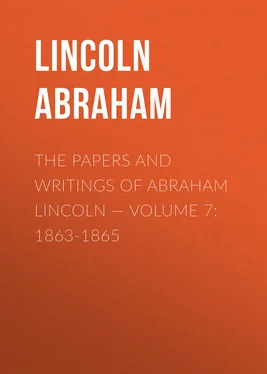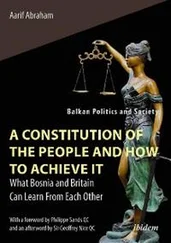Abraham Lincoln - The Papers And Writings Of Abraham Lincoln — Volume 7 - 1863-1865
Здесь есть возможность читать онлайн «Abraham Lincoln - The Papers And Writings Of Abraham Lincoln — Volume 7 - 1863-1865» — ознакомительный отрывок электронной книги совершенно бесплатно, а после прочтения отрывка купить полную версию. В некоторых случаях можно слушать аудио, скачать через торрент в формате fb2 и присутствует краткое содержание. Жанр: foreign_antique, foreign_prose, на английском языке. Описание произведения, (предисловие) а так же отзывы посетителей доступны на портале библиотеки ЛибКат.
- Название:The Papers And Writings Of Abraham Lincoln — Volume 7: 1863-1865
- Автор:
- Жанр:
- Год:неизвестен
- ISBN:нет данных
- Рейтинг книги:3 / 5. Голосов: 1
-
Избранное:Добавить в избранное
- Отзывы:
-
Ваша оценка:
- 60
- 1
- 2
- 3
- 4
- 5
The Papers And Writings Of Abraham Lincoln — Volume 7: 1863-1865: краткое содержание, описание и аннотация
Предлагаем к чтению аннотацию, описание, краткое содержание или предисловие (зависит от того, что написал сам автор книги «The Papers And Writings Of Abraham Lincoln — Volume 7: 1863-1865»). Если вы не нашли необходимую информацию о книге — напишите в комментариях, мы постараемся отыскать её.
The Papers And Writings Of Abraham Lincoln — Volume 7: 1863-1865 — читать онлайн ознакомительный отрывок
Ниже представлен текст книги, разбитый по страницам. Система сохранения места последней прочитанной страницы, позволяет с удобством читать онлайн бесплатно книгу «The Papers And Writings Of Abraham Lincoln — Volume 7: 1863-1865», без необходимости каждый раз заново искать на чём Вы остановились. Поставьте закладку, и сможете в любой момент перейти на страницу, на которой закончили чтение.
Интервал:
Закладка:
But if it be proper to require as a test of admission to the political body an oath of allegiance to the Constitution of the United States and to the Union under it, why also to the laws and proclamations in regard to slavery? Those laws and proclamations were enacted and put forth for the purpose of aiding in the suppression of the rebellion. To give them their fullest effect there had to be a pledge for their maintenance. In my judgment, they have aided and will further aid the cause for which they were intended. To now abandon them would be not only to relinquish a lever of power, but would also be a cruel and an astounding breach of faith. I may add at this point that while I remain in my present position I shall not attempt to retract or modify the emancipation proclamation, nor shall I return to slavery any person who is free by the terms of that proclamation or by any of the acts of Congress. For these and other reasons it is thought best that support of these measures shall be included in the oath, and it is believed the Executive may lawfully claim it in return for pardon and restoration of forfeited rights, which he has clear constitutional power to withhold altogether or grant upon the terms which he shall deem wisest for the public interest. It should be observed also that this part of the oath is subject to the modifying and abrogating power of legislation and supreme judicial decision.
The proposed acquiescence of the National Executive in any reasonable temporary State arrangement for the freed people is made with the view of possibly modifying the confusion and destitution which must at best attend all classes by a total revolution of labor throughout whole States. It is hoped that the already deeply afflicted people in those States may be somewhat more ready to give up the cause of their affliction if to this extent this vital matter be left to themselves, while no power of the National Executive to prevent an abuse is abridged by the proposition.
The suggestion in the proclamation as to maintaining the political framework of the States on what is called reconstruction is made in the hope that it may do good without danger of harm. It will save labor and avoid great confusion.
But why any proclamation now upon this subject? This question is beset with the conflicting views that the step might be delayed too long or be taken too soon. In some States the elements for resumption seem ready for action, but remain inactive apparently for want of a rallying point — a plan of action. Why shall A adopt the plan of B rather than B that of A? And if A and B should agree, how can they know but that the General Government here will reject their plan? By the proclamation a plan is presented which may be accepted by them as a rallying point, and which they are assured in advance will not be rejected here. This may bring them to act sooner than they otherwise would.
The objections to a premature presentation of a plan by the National Executive consist in the danger of committals on points which could be more safely left to further developments. Care has been taken to so shape the document as to avoid embarrassments from this source. Saying that on certain terms certain classes will be pardoned with rights restored, it is not said that other classes or other terms will never be included. Saying that reconstruction will be accepted if presented in a specified way, it is not said it will never be accepted in any other way.
The movements by State action for emancipation in several of the States not included in the emancipation proclamation are matters of profound gratulation. And while I do not repeat in detail what I have heretofore so earnestly urged upon this subject my general views and feelings remain unchanged and I trust that Congress will omit no fair opportunity of aiding these important steps to a great consummation.
In the midst of other cares, however important we must not lose sight of the fact that the war power is still our main reliance. To that power alone we look yet for a time to give confidence to the people in the contested regions that the insurgent power will not again overrun them. Until that confidence shall be established little can be done anywhere what is called reconstruction. Hence our chiefest care must still be directed to the Army and Navy who have thus far borne their harder part so nobly and well; and it may be esteemed fortunate that giving the greatest efficiency to these indispensable arms we do also honorably recognize the gallant men, from commander to sentinel, who compose them, and to whom more than to others the world must stand indebted for the home of freedom disenthralled, regenerated, enlarged, and perpetuated.
A. LINCOLN.
MESSAGE TO CONGRESS. WASHINGTON D. C., December 8, 1863
In conformity to the law of July 16, 1862, I most cordially recommend that Captain John Rogers United States Navy, receive a vote of thanks from Congress for the eminent skill and gallantry exhibited by him in the engagement with the rebel armed ironclad steamer Fingal, alias Atlanta, whilst in command of the United States ironclad steamer Weehawken, which led to her capture on the 17th June, 1863, and also for the zeal, bravery, and general good conduct shown by this officer on many occasions.
This recommendation is specially made in order to comply with the requirements of the ninth section of the aforesaid act, which is in the following words, viz:
That any line officer of the Navy or Marine Corps may be advanced one grade if upon recommendation of the President by name he receives the thanks of Congress for highly distinguished conduct in conflict with the enemy or for extraordinary heroism in the line of his profession.
A. LINCOLN.
MESSAGE TO THE SENATE. WASHINGTON, D. C., December 8, 1863
Congress, on my recommendation, passed a resolution, approved 7th February, 1863, tendering its thanks to Commander D. D. Porter "for the bravery and skill displayed in the attack on the post of Arkansas on the 10th January, 1863," and in consideration of those services, together with his efficient labors and vigilance subsequently displayed in thwarting the efforts of the rebels to obstruct the Mississippi and its tributaries and the important part rendered by the squadron under his command, which led to the surrender of Vicksburg.
I do therefore, in conformity to the seventh section of the act approved 16th July, 1862, nominate Commander D. D. Porter to be a rear-admiral in the Navy on the active list from the 4th July, 1863, to fill an existing vacancy.
A. LINCOLN.
TELEGRAM TO GENERAL U. S. GRANT
MAJOR-GENERAL GRANT:
Understanding that your lodgment at Chattanooga and Knoxville is now secure, I wish to tender you, and all under your command, my more than thanks, my profoundest gratitude, for the skill, courage, and perseverance with which you and they, over so great difficulties, have effected that important object. God bless you all!
A. LINCOLN.
TO GOVERNOR CURTIN
HIS EXCELLENCY A. G. CURTIN,
Governor of Pennsylvania.
DEAR SIR: — I have to urge my illness, and the preparation of the message, in excuse for not having sooner transmitted you the inclosed from the Secretary of War and Provost Marshal General in response to yours in relation to recruiting in Pennsylvania. Though not quite as you desire, I hope the grounds taken will be reasonably satisfactory to you. Allow me to exchange congratulations with you on the organization of the House of Representatives, and especially on recent military events in Georgia and Tennessee.
Читать дальшеИнтервал:
Закладка:
Похожие книги на «The Papers And Writings Of Abraham Lincoln — Volume 7: 1863-1865»
Представляем Вашему вниманию похожие книги на «The Papers And Writings Of Abraham Lincoln — Volume 7: 1863-1865» списком для выбора. Мы отобрали схожую по названию и смыслу литературу в надежде предоставить читателям больше вариантов отыскать новые, интересные, ещё непрочитанные произведения.
Обсуждение, отзывы о книге «The Papers And Writings Of Abraham Lincoln — Volume 7: 1863-1865» и просто собственные мнения читателей. Оставьте ваши комментарии, напишите, что Вы думаете о произведении, его смысле или главных героях. Укажите что конкретно понравилось, а что нет, и почему Вы так считаете.












